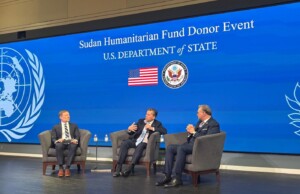Sudan news media call three-day strike
On Thursday, Sudanese journalists embarked on a three-day strike in response to peaceful demonstrations and protests across the country, protesting the authorities’ continued crackdown on press freedom and expression, and the arrest of a number of journalists.
 Journalists on strike in Khartoum
Journalists on strike in Khartoum
On Thursday, Sudanese journalists embarked on a three-day strike in response to peaceful demonstrations and protests across the country, protesting the authorities’ continued crackdown on press freedom and expression, and the arrest of a number of journalists.
Journalists described the strike to Radio Dabanga as successful so far. They received great response from all press agencies in the country, and that the strike rate in some newspapers was 100 per cent.
Journalist Nada Ramadan of El Jareeda newspaper told Radio Dabanga that the journalists’ strike is in support of the protests throughout the country. She pointed out that the authorities continue to suppress the press, confiscate newspapers, exercise censorship and summoning of journalists.
She called on newspaper publishers to respond to the strike.
Journalist Azza Ibn Auf told Radio Dabanga that the journalists’ strike was aimed at protesting against banning of the media from covering the demonstrations, this in addition to condemning the killing of the peaceful demonstrators and use violence against them.
She praised the journalists’ response to the strike.
Papers banned
She ruled out the impact of journalists’ strike on the coverage of the protests, noting that paper-based newspapers were banned from publishing news of demonstrations and that journalists were using other methods to cover the protests.
Journalist Abdelhadi El Haj of El Jareeda newspaper said in an interview with Radio Dabanga strike is a message to the security apparatus to stop its restrictions against the press, explaining that the strike will be followed by other steps to be announced soon.
He ruled out a media vacuum in covering the protests, pointing to the continued coverage of foreign agencies and satellite channels.
He explained that journalists are using social media to cover the protests to prevent a media vacuum.
On Thursday, the security authorities held a number of journalists from the office of El Tayyar daily because they were striking. They were released later.











 and then
and then